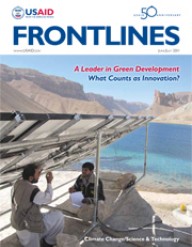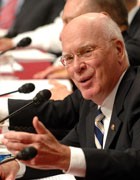FrontLines: What is behind your interest in the environment and climate change?
SEN. PATRICK LEAHY: I come from a state that has a long history as a leader on environmental stewardship. Vermonters have always put a premium on protecting the environment, and we are also outward looking. Vermonters understand that we do not live in isolation. The destruction of forests and pollution of the atmosphere and oceans affects us no matter where it occurs. Over the past two decades, as chairman or ranking member of the State and Foreign Operations Subcommittee, I have traveled to many countries where forests and wildlife are being destroyed, glaciers are melting, and water is becoming scarce, while populations increase. We are facing a global environmental crisis that may be catastrophic for future generations, yet many in Congress seem unknowing or uncaring about it. For the sake of my grandchildren and for the planet, and I think we should be confronting it with more thought, action, and urgency.
FL: As chairman of the State and Foreign Operations appropriations subcommittee, how do you see climate change affecting long-term development strategies?
LEAHY: If current warming trends continue, many countries will experience dramatic changes, including countries that already face acute food and water shortages. The growing demand for energy in developing countries—often from fossil fuels—and the deluge of impoverished people from rural to urban areas seeking jobs, are compounding the problem. Climate change may well cause large population shifts that governments are unprepared for, and accompanying instability and conflict. All of this and more needs to be part of our dialogue with other donors, governments, and civil society organizations about their development challenges and choices.
FL: How do you respond to Congressional colleagues who doubt the seriousness of the threats posed by climate change?
LEAHY: The Earth's climate is changing. We can debate the causes, but no one can credibly deny that it is happening. Even slight changes in temperature can have dramatic effects, especially for food production and the availability of water. In our daily lives we all see abundant examples of the human footprint on our planet. It only stands to reason that so much activity for so long would have some cumulative effect on the rest of nature, and on us. There are many examples of it already, and to those who doubt it, I can only urge that they talk to people, including in parts of our own country, who are already experiencing it.
FL: What's the prognosis for climate change or clean energy legislation in the 112th Congress?
LEAHY: Not good. When some in Congress will stand in the way of any legislation unless it weakens regulations on drilling or mining for fossil fuels, it is hard to be optimistic. But there are some things we are doing, and will continue to do, in the State and Foreign Operations Subcommittee, where Democrats and Republicans work together to provide funding to protect tropical forests which absorb huge amounts of carbon, and to promote renewable energy in developing countries. It is a small commitment of resources compared to what is needed, but it does make a difference.










Comment
Make a general inquiry or suggest an improvement.